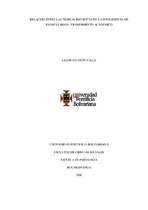Mostrar el registro sencillo del ítem
Relación entre las teorías implícitas de la inteligencia de padres e hijos y rendimiento académico
| dc.contributor.advisor | Villamizar Acevedo, Gustavo | |
| dc.contributor.author | Gayón Valle, Liliana | |
| dc.coverage.spatial | Seccional Bucaramanga. Universidad Pontificia Bolivariana. Escuela de Ciencias Sociales. Facultad de Psicología | spa |
| dc.coverage.temporal | 2010 | |
| dc.date.accessioned | 2013-08-28T16:59:33Z | |
| dc.date.available | 2013-08-28T16:59:33Z | |
| dc.date.created | 2010-08-02 | |
| dc.date.issued | 2013-08-28 | |
| dc.identifier.uri | http://hdl.handle.net/20.500.11912/826 | |
| dc.description | 82p.: (pdf); tablas | spa |
| dc.description.abstract | Esta investigación desarrolló el tema de teorías implícitas de la inteligencia (Dweck, 2007), desde un enfoque cuantitativo de diseño correlacional. Tuvo por objetivo identificar la relación entre las teorías implícitas de la inteligencia de un grupo de padres en sus hijos y la influencia de ellas en el rendimiento académico. El instrumento base fue el The Implicit Theory of Intelligence Scale (ITIS), cuestionario que originalmente fue diseñado por Abd-El-Fattah & Yates (2006), y que posteriormente fue traducido y adaptado en este estudio siguiendo las pautas trazadas por expertos (Muñiz y Hambleton, 1996; Flores, Contreras y Backhoff, 2006), buscando la validación del mismo. Este cuestionario contó con una apropiada confiabilidad y validez, y fue aplicado a una población de 60 estudiantes de sexto grado así como al padre más representativo, del Instituto Técnico Superior Industrial, de la ciudad de Barrancabermeja (Santander). Entre los resultados se encontró predominancia de la teoría implícita fija de la inteligencia, tanto en los estudiantes como en sus padres, y la existencia de relación entre teorías implícitas fijas y el rendimiento académico. Por otro lado, no se evidenció un nivel significativo de relación entre teorías implícitas en padres y las teorías implícitas que los hijos construyen. Se concluyó que aspectos socioculturales como el estrato socioeconómico, y factores como la edad, el género y el tipo de institución educativa, pueden influir en la construcción de concepciones personales alrededor de la inteligencia. Investigaciones futuras en este campo, deberían incluir los aspectos socioculturales ya citados, e involucrar en el estudio no sólo a padres de familia, sino también a los profesores, ya que son elementos clave en el contexto en el cual se desarrolla el estudiante. | spa |
| dc.description.abstract | This research develops the topic of implicit theories of intelligence (Dweck, 2007), from a quantitative approach of design correlacional. It has for aim identify the relation between the implicit theories of the intelligence of a group of parents in their children and the influence of them in the academic performance. The instrument bases it is the The Implicit Theory of Intelligence Scale (ITIS), questionnaire that originally was designed by Abd-El-Fattah and Yachts (2006), and that later was translated and adapted in this study following the guidelines planned by experts (Muñiz and Hambleton, 1996; Solano, Contreras and Backhoff, 2006), looking for the validation of the same one. This questionnaire possesses an appropriate reliability and validity, and it was applied to a population of 60 students of sixth degree as well as to the most representative father, of the Technical Institute Industrial Superior, of Barrancabermeja\'s city (Colombia). Among the results one thought that both in students and in family parents it predominates over the implicit fixed theory of intelligence, beside a relation existed between implicit fixed theories and the academic performance, in case of the students. On the other hand, a significant level of relation was not demonstrated between implicit theories in parents and the implicit theories that the children construct. To conclude, sociocultural aspects as the socioeconomic status, and factors as the age, the genre and the type of educational institution, can influence the construction of personal conceptions about the intelligence. Future researches in this field, should include the sociocultural already mentioned aspects, and besides it to involve not only family parents inside the study, but also to the teachers, since they are constituted in key elements in the context in which the student develops. | |
| dc.language.iso | es | |
| dc.publisher | Universidad Pontificia Bolivariana | spa |
| dc.rights | Attribution-NonCommercial-NoDerivatives 4.0 International | * |
| dc.rights.uri | http://creativecommons.org/licenses/by-nc-nd/4.0/ | * |
| dc.subject | Tesis y disertaciones académicas | spa |
| dc.subject | Psicología | spa |
| dc.subject | Inteligencia | spa |
| dc.subject | Padres e hijos | spa |
| dc.subject | Relaciones padres e hijos | spa |
| dc.title | Relación entre las teorías implícitas de la inteligencia de padres e hijos y rendimiento académico | spa |
| dc.type | bacherlorThesis | spa |
| dc.rights.accessRights | openAccess | spa |
| dc.type.hasVersion | publishedVersion | spa |
| dc.identifier.instname | instname:Universidad Pontificia Bolivariana | spa |
| dc.identifier.reponame | reponame:Repositorio Institucional de la Universidad Pontificia Bolivariana | spa |
| dc.identifier.repourl | repourl:https://repository.unab.edu.co/ |
Ficheros en el ítem
Este ítem aparece en la(s) siguiente(s) colección(ones)
-
Trabajos de grado [6440]
Monografías, artículos, informes, proyecto de grado


